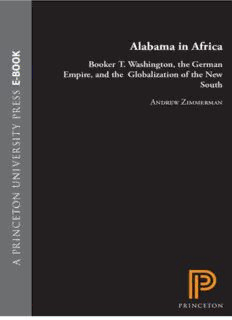
Alabama in Africa: Booker T. Washington, the German Empire, and the Globalization of the New South PDF
Preview Alabama in Africa: Booker T. Washington, the German Empire, and the Globalization of the New South
Alabama in Africa Alabama in Africa BOOKER T. WASHINGTON, THE GERMAN EMPIRE, AND THE GLOBALIZATION OF THE NEW SOUTH Andrew Zimmerman PRINCETON UNIVERSITY PRESS PRINCETON AND OXFORD Copyright©2010byPrincetonUniversityPress PublishedbyPrincetonUniversityPress,41WilliamStreet, Princeton,NewJersey08540 IntheUnitedKingdom:PrincetonUniversityPress,6OxfordStreet, Woodstock,OxfordshireOX201TW press.princeton.edu AllRightsReserved Secondprinting,andfirstpaperbackprinting,2012 PaperbackISBN978-0-691-15586-9 TheLibraryofCongresshascatalogedtheclotheditionof thisbookasfollows Zimmerman,Andrew. AlabamainAfrica:BookerT.Washington,theGermanempire, andtheglobalizationofthenewSouth/AndrewZimmerman. p. cm.—(Americaintheworld) Includesbibliographicalreferencesandindex. ISBN978-0-691-12362-2(cloth:alk.paper) 1.Cottontrade—Togo—History.2.Agriculturallaborers— Togo—History.3.Germany—Colonies—Africa.4.TuskegeeInstitute. 5.Washington,BookerT.,1856–1915.I.Title. HD9087.T62Z562010 338.1′35109668109041—dc22 2009044502 BritishLibraryCataloging-in-PublicationDataisavailable ThisbookhasbeencomposedinSabon Printedonacid-freepaper.∞ PrintedintheUnitedStatesofAmerica 3 5 7 9 10 8 6 4 2 CONTENTS ListofIllustrations vii Preface ix INTRODUCTION 1 CHAPTER1 Cotton,the“NegroQuestion,”andIndustrial EducationintheNewSouth 20 CottonandCoercion 23 GrowingCottonintheOldSouthandtheNew 32 The“NegroQuestion”andtheNewSouth 38 HamptonInstitute:FromColonialEducation toIndustrialEducation 40 TuskegeeInstitute:AnAmbivalentChallenge totheNewSouth 45 BookerT.Washington’sPan-Africanism andtheTurntoEmpire 61 CHAPTER2 SozialpolitikandtheNewSouthinGermany 66 GermanSocialThoughtandtheAmericanCivilWar 67 EmancipationandFreeLaborinGermany 70 Germany’sNewSouth:SocialScience,SocialPolicy, andtheFreedomofFreeLabor 73 GermanSettlersandPolishMigrants:InternalColonization andtheStruggleoverLabor,Sexuality,andRace 80 SocialDemocracyversusInternalColonization andStateSocialism 95 Raceandthe“DarkUrgeforPersonalFreedom”: MaxWeberandW.E.B.DuBois 100 CHAPTER3 AlabamainAfrica:Tuskegeeandthe ColonialDecivilizingMissioninTogo 112 TogobetweenAtlanticSlaveryandGermanColonialRule 113 MissionSchools,White-CollarWork,andPoliticalResistance 123 EweEducationandGermanColonialRule 128 Cotton,Conquest,andtheSouthernTurnofColonialRule 130 vi CONTENTS FromColonialAfricanstoNewSouth“Negroes” 139 TuskegeeEducatorsandAfricanHouseholds 144 TheTransformationofTogoleseCotton 148 UndoingtheExodus:TheColonialDecivilizingMission attheNotse´ CottonSchool 153 MissionaryEducationandIndustrialEducationinTogo 162 GermanInternalColonizationandAmerican SharecroppinginTogo 166 CHAPTER4 FromaGermanAlabamainAfricatoaSegregationistInternational: TheLeagueofNationsandtheGlobalSouth 173 E.D.Morel,CongoReform,andthe German-TuskegeeColonialModel 176 BookerT.Washington,CongoReform, andIndustrialEducationinAfrica 179 TheNegerfrageinGermany:ColonialPolicy, ColonialSocialScience,andColonialScandals 187 SocialDemocracyversustheCivilizingMission 197 TheVersaillesTreatyandtheSegregationistInternational 198 CHAPTER5 FromIndustrialEducationfortheNewSouthtoaSociology oftheGlobalSouth 205 MaxWeber,BookerT.Washington,andW.E.B.DuBois 207 From“TeachingtheNegrotoWork”tothe“ProtestantEthic” 212 SociologyfortheOldSouthandtheNew 217 RobertE.Park,fromGermanytoAfricatoTuskegee andBackAgain 219 FromtheGlobalSouthtotheChicagoSchoolofSociology 222 TheGreatMigrationandtheTransformationofSociology 227 CONCLUSION PrussianPathsofCapitalistDevelopment: TheTuskegeeExpeditiontoTogobetweenTransnational andComparativeHistory 237 Notes 251 Bibliography 347 Index 391 ILLUSTRATIONS I.1 MapofGermanTogo. 2 I.2 JamesNathanCalloway,theleaderofthe Tuskegeeexpedition,travelsbyhammockinTogo. 6 I.3 JohnWinfreyRobinsonatthetwenty-fifth- anniversarycelebrationofTuskegeeInstitute,1906. 7 1.1 Spinningjenny. 26 1.2 BalesofAmericancottoninawarehouseatthe BremenCottonExchange. 29 1.3 The“kinaesthetic”processbywhichthestaplelength and“character”ofcottonwasdetermined. 30–31 1.4 Cottonharvest. 33 1.5 MalesEngagedinAgricultureinSeven SoutheasternStates. 38 1.6 Interiorofthe“Negrobuilding”atthe AtlantaExposition. 50 1.7 The“OldPlantation”onthemidwayofthe AtlantaExposition. 51 2.1 Sugarbeet. 83 2.2 Weedingsugarbeetfieldswithhoes. 84 2.3 Thinningouttheyoungbeets. 85 3.1 OilpalmsalongtheroadtoTove. 117 3.2 MarketdayinTogo. 119 3.3 MixedcultivationinTogo. 121 3.4 Spinningcotton,Togo. 122 3.5 Weavingcotton,Togo. 123 3.6 AfricandandiesinTogo. 127 3.7 OneoftheTuskegeeplantationbuildings stillstandinginTove. 135 3.8 Polizeisoldaten. 141 3.9 PlowinginTove,1905. 144 3.10 TransportingcottonontheroadfromHotoPalime. 145 3.11 “RailroadandCottonMapofTogo,”c.1909. 150 3.12 PackingcottoninTogo.SEM,062 152 3.13 Cottonpurchasingagent,Noepe,1906. 153 3.14 PurchasingcottoninaTogolesemarket. 154 3.15 CourtyardinNotse´. 157 3.16 CottonfieldinNotse´. 158 viii LIST OF ILLUSTRATIONS 3.17 Recentreconstructionofthemudwallbuilt byKingAgokoli’ssubjects. 161 3.18 Ginstation,Notse´,1906–1907. 163 4.1 CarryingcottontoaSocie´te´ togolaisedecoton(Sotoco) depot,nearAtakpame. 174 4.2 ColonialcottoncultivationinAfrica,1915. 175 4.3 Studentshoeingcottoninexperimentalfields, TuskegeeInstitute,1902. 181 PREFACE IN JANUARY 1901 four African American men from Tuskegee Institute, the Alabama teacher-trainingschool founded by BookerT. Washington, arrived in the German colony of Togo, West Africa, to help transform the territoryinto a source ofcotton for the Europeanspinning industry. Alabama in Africa reconstructs this expedition and its global conse- quencesfromtheperspectivesofitsAmerican,African,andGermanparti- cipants.Itexploresthetransnationaleconomic,political,andideological networks that connected Booker T. Washington’s American South, the kaiser’sGermany,andcolonialWestAfrica.Theglobalcollapseofunfree labor—both Atlantic slavery and European serfdom—profoundly af- fectedeachoftheseregionsinthenineteenthcentury.TheAtlantictransi- tionto freelabor unleashednewpolitical andeconomic energiesamong former bondspeople, energies that employers and states endeavored to redirectfortheirownprofitandpower. Alabama in Africa reveals how early, tentative efforts by Booker T. WashingtontotransformtheplaceofblacksintheAmericanSouthgave way to his better-known “accommodationism” as a result of his work with German imperialism in Africa. The pioneering interest of German colonialpersonnelinTuskegeeInstitute,inturn,helpedmaketheAmeri- can South of segregation and sharecropping a model for the supposedly humanitarian internationalism of the League of Nations. The model of the American South and individual African Americans, including Wash- ingtonandW.E.B.DuBois,alsoinfluencedthehistoryoffreelaborinside the borders of Germany, shaping the development of the social sciences andthestatesocialpoliciesforwhichGermanyhasbeensoadmired,as well asthe treatment ofPoles forwhich it hasbeen so reviled.Alabama in Africa rejects empire-centered approaches to colonialism that regard Africansasrawclayforcolonialsculpting,demonstratingratherthatthe history of Togolese self-fashioning in the aftermath of Atlantic slavery structured and resisted the various attempts by missionaries, colonial states,andTuskegeeInstitutetocreateanAfricaaftertheirowndesires. Alabama in Africa offers a transnational historical narrative, grounded inarchivalresearchandrecentmethodsinthehistoryofculture,gender, andsexualityasananswertoanowvenerabletopicofcomparativesocial scienceabouttheriseofcapitalismaroundtheworld.Itsuggests,finally, thatracismandimperialism,aswellasstrugglesofclass,culture,gender,
Description: